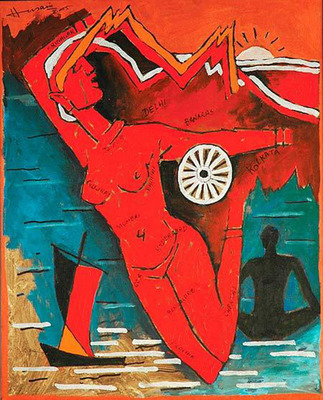I am offended ⚓
06 Feb 2015To start with, here’s a piece of art that is meant to offend you:
The above is an artwork by MF Hussain. Its was sold as an untitled work by Hussain to a private collector, but was named Bharat Mata later when it was sold in an auction.
Were you offended by looking at it? Maybe. Does it look vulgar and offensive to you? Perhaps. What should you do as a result?
CLOSE THE TAB!
Seriously, India. The right thing to do when you are offended is not to lynch a person to death, or to issue a fatwa against singing the national song. The right thing to do is this:

The right to get offended in India is a result of the way our constitution curbs the freedom of speech. However, these restrictions were not in the constitution that was passed when India was made a republic (26 Jan 1950). It was added as the First Amendment (ironic, I know), which passed in June 1951.
In the 18 months that passed between these two events, Indians had the right to absolute freedom of speech. I won’t go into the details of why both Nehru and Patel thought of bringing these restrictions (for the better of India), but needless to say, the reasons are no longer valid.
However, I found a curious piece of irony while researching this:
One of the prime opponents to the First Amendment restrictions was Syama Prasad Mookerjee, a long time RSS activist, founder of the Bharatiya Jana Sangh and widely regarded as the godfather of Hindu Nationalism.
And now today, 64 years later, these restrictions are getting enacted into even more draconian laws. One such law is Section 66A of the Information Technology Act.
Kapil Sibal, former union minister writes about it:
Allowing the government to regulate the internet is a recipe for disaster. Government being what it is, it would use such power to further its own ends.
However, he gives in to the diplomatic reasoning and writes further:
I know where I stand. I am for freedom of expression, but there are no absolutes in life. Limitless freedom contains within it the seeds of conflict. We must eschew conflict and embrace freedom, for peace and harmony.
Note that back in 2012, Kapil Sibbal had spoken in favor of Section 66A, citing it as a tool to protect women online. He seems to have reversed his stance since.
This is what Tushar Mehta, Additional Solicitor General has to say on the necessity of the act:
[…] every institution and every person right from the President can be subjected to criticism and it is people’s fundamental right to free speech and expression but such rights do not cover grossly offensive comments and posts on social networking sites.
AIB recently tested their rights by making a grossly offensive video and posting it on social networking sites. A lot of people were offended. The video was taken down as a result.
Did the people who were offended see the video? Yes, probably on YouTube. But the recordings are still floating around, and are available on torrents very easily.
You see, the internet is a resilient beast. You can’t control it, or bend it to your will. It does not run by your rules, and your sense of sensibility. It has no concept of right or wrong. It just is.
A nation where I am afraid to post critical views of the government or discuss events that might offend someone is not a nation worth living in.
The internet cannot be regulated. You might certainly think of it as possible, but we will always find a way.
If you are offended it is your problem, and frankly lots of things offend lots of people. - Salman Rushdie
I don’t think I will ever see the first amendment repealed in my lifetime. However, I’m gonna try my very best to get the Supreme Court to re-evaluate Section 66A as unconstitional and over-reaching.
If you want to let the government know of your thoughts on the matter, the Assistant Solicitor General (representing the Government in the case) can be reached at tusharmehta64@yahoo.com.
Further Reading
This is a loose list of various references and readings on the topic.
- A Story of Censorship: How the Right to Take Offense is Shrinking Free Speech in India - A video seminar on the topic by Anuradha Raman, Outlook Magazine
- First Amendment of the Constitution of India
- Why Nehru and Sardar Patel curbed freedom of expression in India - A nice summary of the events that lead to the passing of the First Amendment
- Bharat Mata a work of art - A ruling by the Supreme Court declaring the topmost image in this post as a work of art, and that no one gets scandalized looking at art.
- Restrictions on freedom of speech in India
- An excellent piece on abolishing the restrictions on free speech titled Of writers and poets who criticize with their pens (Rajeev Mantri)
- A few pieces on the ongoing panel: India Today, Indian Express, Firstpost’s Summary
Thanks to Shashank Mehta and Ravi Kishore for reviewing drafts of this.
Published on February 06, 2015

